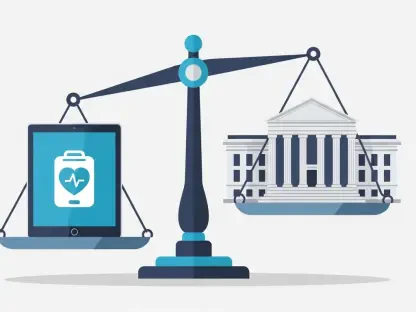Clinical Documentation Integrity (CDI) has emerged as a transformative force in healthcare compliance, evolving from a simple tool designed for coding accuracy to an integral component for audit defense, revenue integrity, and patient-centered care. Initially focusing on hospital inpatient reimbursement, CDI now plays a vital role across the healthcare continuum, including outpatient and ambulatory settings. This shift signifies CDI’s expanded function in addressing regulatory adherence, safeguarding against audit risks, and ensuring the financial health of healthcare organizations. As healthcare models advance towards higher value-based care standards, CDI continues to adapt, becoming an essential element in achieving sustainable revenue strategies and comprehensive patient care.
Evolution of CDI
From Coding Accuracy to Comprehensive Compliance
In recent years, CDI has expanded from its primary focus on ensuring coding accuracy to serve as a multi-disciplinary tool, addressing broader compliance needs across healthcare systems. This evolution represents a strategic shift, leveraging CDI in various inpatient and outpatient settings to maintain revenue integrity and elevate care quality. This broader role includes not only traditional coding but also documenting comprehensive medical narratives that robustly support every billed service. This transition is imperative for healthcare organizations as they navigate increasingly complex regulatory landscapes while maintaining high standards of patient care and controlling costs.
CDI’s expanded scope facilitates its engagement in numerous healthcare settings, transcending its initial hospital-centric role to encompass ambulatory practices and behavioral health environments. Through this scope, the emphasis on CDI becomes crucial for organizations striving to adhere to stringent compliance protocols and optimize clinical documentation. As a comprehensive tool, CDI aids in eliminating coding ambiguities, thus minimizing risks of audits and ensuring seamless reimbursement processes. Furthermore, the enhanced documentation quality supported by modern CDI initiatives equips healthcare professionals with the necessary tools to render precise and high-quality clinical care, aligning with the industry’s overarching goal of delivering patient-centered services.
Addressing Regulatory Expectations
With the growing demand for precise clinical documentation, CDI professionals are confronted with the challenge of meeting heightened regulatory expectations set forth by entities like the Office of Inspector General (OIG) and the Centers for Medicare & Medicaid Services (CMS). These bodies mandate stringent documentation standards, ensuring that all billed services are firmly supported through meticulously detailed clinical records. This includes elucidating medical reasoning and incorporating specific clinical details to prevent instances of vague diagnoses, overuse of templates, or poorly documented links between conditions and treatment plans. Such rigorous documentation practices serve as a protective measure against audit flags, secure reimbursement, and mitigate denial risks effectively.
The role of CDI in compliance extends beyond coding, encompassing a comprehensive documentation framework that safeguards healthcare entities from potential regulatory scrutiny. By leveraging detailed medical reasoning and specificity in clinical documentation, CDI empowers healthcare organizations to defend their practices against audits. This proactive approach is pivotal in strengthening audit defenses, minimizing denial risks, and ensuring that documentation aligns with evolving healthcare regulations. Through thorough efforts to integrate CDI into compliance strategies, healthcare entities enhance their capability to support billed services comprehensively while maintaining adherence to regulatory guidelines, translating into sustained financial health and high-quality patient care.
Expanding CDI into Outpatient Settings
Significance in Medicare Advantage Plans
The shift towards Medicare Advantage plans and the adoption of value-based care models have elevated the significance of outpatient CDI initiatives. As healthcare systems gravitate towards these models, precise documentation of chronic conditions becomes increasingly vital. This meticulous documentation effort drives accurate risk adjustment, influencing capitated payment models and ensuring that healthcare organizations can sustain economic viability while maintaining high standards of patient care. By focusing on outpatient settings, CDI initiatives respond to evolving healthcare demands, emphasizing accurate documentation to support strategic financial planning and enhance healthcare delivery.
Outpatient CDI represents an essential tool in influencing risk adjustment scores, impacting reimbursement models effectively. Documentation precision becomes critical as healthcare entities strive for improved economic outcomes while accurately reflecting population health statistics. Failure to adequately capture crucial details within outpatient settings can lead to distorted risk scores, impacting financial strategies and population health evaluations. By prioritizing the accurate documentation of chronic conditions, outpatient CDI initiatives champion robust risk models, leading to improved outcomes within Medicare Advantage plans and fostering a healthier, more efficiently managed patient population. These initiatives underscore the indispensable role outpatient CDI plays in advancing healthcare practices.
Enhancing Risk Adjustment and Patient Stratification
The precise capture of Hierarchical Condition Categories (HCCs) through CDI initiatives in outpatient settings has become paramount as healthcare systems focus on enhancing risk adjustment accuracy. Successful HCC documentation serves as a linchpin in influencing risk scores, directly impacting reimbursement integrity and reflecting a true representation of patient population health outcomes. Efforts to accurately capture HCCs translate into improvements in patient stratification, quality scores, and better comprehensive care delivery. Organizations investing in outpatient CDI efforts witness tangible benefits, including enhanced documentation practices facilitating strategic financial planning and advances in care standards.
The expansion of risk adjustment initiatives, bolstered by effective outpatient CDI practices, drives healthcare organizations to prioritize documentation accuracy. This focus on precise capturing of HCCs leads to improved risk alignment, optimizing capitated payment models while emphasizing thorough patient stratification. Accurate risk scores derived from well-documented clinical narratives ensure reimbursement reflects genuine patient health conditions, securing financial stability and aligning healthcare delivery with population health objectives. By leveraging outpatient CDI, healthcare systems enhance patient care strategies while reinforcing compliance standards and promoting economic sustainability within the sector.
Technological Integration in CDI
Leveraging AI and NLP Tools
Technology has become an indomitable force in transforming CDI practices, with Artificial Intelligence (AI) and Natural Language Processing (NLP) tools providing unprecedented support in real-time chart analyses. These tools are instrumental in identifying incomplete documentation, assisting healthcare professionals in flagging issues, and prompting appropriate clinical queries. The adoption of AI and NLP enhances documentation efficiency by automating routine tasks, yet human oversight remains essential to preserve clinical context and ensure documentation meets provider satisfaction standards. This seamless blend of technology with human expertise captures comprehensive clinical narratives while maintaining high documentation quality.
The deployment of AI and NLP technologies within CDI practices underscores a significant advancement, elevating healthcare compliance through automated solutions. These technologies empower CDI specialists by reducing manual documentation burdens, driving efficiency, and enabling focus on critical clinical insights. Through real-time analysis capabilities, AI and NLP tools facilitate streamlined documentation processes while ensuring precision in capturing comprehensive narratives. The technological integration complements manual review efforts, enhancing outcomes and reinforcing clinical documentation integrity. This synergy between innovation and expertise defines the evolving landscape of CDI, rendering it increasingly efficient in meeting compliance goals.
The Hybrid Approach: Merging Technology with Expertise
Implementing a hybrid approach, which combines technological solutions with clinical expertise, has proven effective in enhancing the accuracy and integrity of clinical documentation. By leveraging AI tools for chart triage and complementing them with experienced CDI specialist reviews, healthcare organizations achieve success in improving documentation processes. This balanced strategy augments the role of CDI professionals, facilitating efficient clinical validation while maintaining robust documentation standards. As technology continues to evolve, the harmonious integration of AI with expert assessments demonstrates the importance of maintaining human oversight alongside innovative solutions.
The hybrid approach in CDI practices reflects an ongoing commitment to achieving the optimal balance between advanced technology and clinical oversight. Integrating AI technologies in real-time chart analyses fosters efficiency and aides in flagging documentation shortages, yet the nuanced interpretation of clinical narratives requires human expertise. By merging innovation with clinical validation, healthcare organizations realize documentation accuracy improvements, enhancing compliance adherence and financial integrity. This collaborative strategy reflects the industry’s relentless pursuit of technological advancements while preserving the indispensable role of clinical acumen in supporting comprehensive healthcare delivery.
Clinician Engagement
Building Trust and Collaboration
For CDI to be truly effective, fostering strong relationships with clinicians and emphasizing trust and collaboration is crucial. By establishing these relationships, CDI professionals can demonstrate the direct impact of documentation quality on care delivery and reimbursement processes to physicians. Educational initiatives that deliver real-time insights into the significance of high-quality documentation serve as pivotal instruments in transforming CDI from a mere administrative task into a dynamic partnership in patient care. This approach cultivates an environment where clinicians view CDI as an ally, reinforcing teamwork and shared goals in enhancing patient outcomes.
Clinician engagement forms the cornerstone for successful CDI practices. Strengthening collaboration between CDI specialists and physicians fosters trust, encouraging healthcare providers to embrace documentation improvements as integral components of care delivery. By illustrating the downstream impact of refined documentation on healthcare reimbursement processes, CDI professionals elevate the perception of compliance from burdensome to strategic. This paradigm shift fosters the integration of documentation initiatives with patient care strategies, underscoring the symbiotic relationship between clinical excellence and regulatory adherence, and cultivating an ideal environment for delivering superior healthcare experiences.
Training and Education Initiatives
Training and education initiatives within healthcare systems play a vital role in comprehensively equipping providers with the skills necessary for precision in medical coding and documentation. These efforts, including documentation boot camps and workshops, prepare healthcare professionals to meet compliance standards and ensure alignment with regulatory expectations. By equipping residents and Advanced Practice Providers (APPs) with critical skills in HCC coding, problem linkage, and understanding the legal implications of documentation practices, these initiatives safeguard the legal and financial integrity of healthcare entities, reinforcing the foundations for consistent high-quality care delivery.
Educational efforts within healthcare systems underscore the importance of precision in clinical documentation and coding practices. Training initiatives, such as documentation boot camps, serve as foundational pillars in empowering clinicians with the expertise necessary for navigating complex regulatory landscapes. Educating healthcare professionals about the nuances of documentation processes aligns their understanding with compliance measures, instilling confidence and fostering informed care delivery. Through comprehensive training programs, healthcare organizations advance their capacity to deliver high-caliber medical services while securing financial strategies and adhering to legal frameworks, ensuring robust healthcare operations.
CDI’s Role in Denial Prevention and Management
Strengthening Documentation for Appeals
In the realm of clinical compliance, CDI specialists play a pivotal role in fortifying documentation, ensuring it withstands rigorous audits and appeals processes. This strength becomes especially vital in cases where high-cost procedures face claims denials. Collaboration among CDI professionals, coders, and clinicians results in clinically valid and payor-aligned appeals, bolstering the healthcare entity’s position in defense against audit challenges. By prioritizing documentation quality, healthcare organizations can reduce the risk of denials and develop strategies that effectively manage claims appeal processes, reinforcing financial stability and patient care standards.
The role of CDI in enhancing documentation quality for appeals underscores its critical function in mitigating the potential economic impacts associated with high-cost procedure denials. By ensuring documentation reflects comprehensive clinical reasoning and aligns with payor expectations, CDI teams develop robust, error-resistant appeals strategies. Collaborative efforts between CDI specialists, coders, and clinicians lead to a unified, informed response to claims audits, safeguarding healthcare revenue cycles from denial risks. This proactive approach ensures healthcare entities can navigate audit challenges effectively, reinforcing compliance adherence and financial resilience while maintaining patient care quality.
Proactive Denial Management Strategies
CDI personnel have taken a proactive approach in engaging with denial management committees, analyzing documentation trends, and informing policy updates to prevent potential audit challenges. This collaborative effort is a testament to CDI’s critical role in proactively addressing denial risks and safeguarding financial health within healthcare organizations. By analyzing real-world case studies, healthcare entities leverage preventive strategies to demonstrate tangible reductions in post-payment audits. Proactive CDI initiatives provide healthcare systems with a robust framework for mitigating audit risks, solidifying their capacity to anticipate challenges and strengthen documentation integrity.
Denial management strategies form an essential component of CDI practices within healthcare systems, illustrating the importance of documentation precision in audit prevention. By actively engaging with denial committees, CDI specialists analyze trends and translate insights into policy enhancements. This proactive approach facilitates the prevention of audit risks, fortifying healthcare systems against potential economic challenges. Through real-world illustrations of successful strategies, healthcare entities recognize significant reductions in post-payment audits, reflecting the efficacy of preventive CDI initiatives in maintaining compliance standards and securing financial stability while safeguarding patient care integrity.
Advancing CDI Program Metrics
Shifting from Basic to Advanced Metrics
As CDI programs mature, the shift from tracking basic metrics to advanced indicators has become increasingly important. Traditional metrics, such as the number of queries issued and physician response rates, are now supplemented with deeper insights reflecting CDI effectiveness, including rates of denial overturn attributable to documentation quality and provider engagement scores. These comprehensive metrics provide healthcare systems with insightful data to assess CDI impact and inform strategic decisions, supporting expansions into new areas. By refining metrics, organizations justify investments in CDI initiatives, ensuring alignment with broader administrative and clinical goals.
The advancement of CDI metrics reflects a broader commitment to refining assessment mechanisms and strengthening strategic decisions within healthcare organizations. Mature CDI programs now prioritize tracking sophisticated indicators such as risk-adjusted reimbursement accuracy, denial overturn rates attributable to improved documentation practices, and provider engagement scores. These advanced metrics deliver robust insights into CDI effectiveness, informing organizational strategies and advocating for program expansions. Through refined metric tracking, healthcare systems bolster CDI initiatives, aligning them with comprehensive administrative objectives, reinforcing documentation fidelity, and enhancing patient care delivery.
Aligning CDI Metrics with Organizational Goals
Clinical Documentation Integrity (CDI) has evolved significantly in the healthcare landscape, transforming from a mere tool for ensuring coding accuracy into a crucial pillar for audit defense, revenue integrity, and patient-centered care. Originally aimed at hospital inpatient reimbursement, CDI now takes on a broader role throughout the healthcare continuum, including outpatient and ambulatory services. This evolution highlights CDI’s expanded responsibility in maintaining regulatory adherence, protecting against audit vulnerabilities, and securing the financial stability of healthcare institutions. As healthcare models shift toward higher standards of value-based care, CDI remains adaptable, becoming indispensable in achieving sustainable revenue management and holistic patient care. Through this adaptive capacity and integration into various healthcare settings, CDI stands as a cornerstone in realizing comprehensive, patient-focused care and financial health, ensuring healthcare organizations navigate complex regulatory environments successfully.









